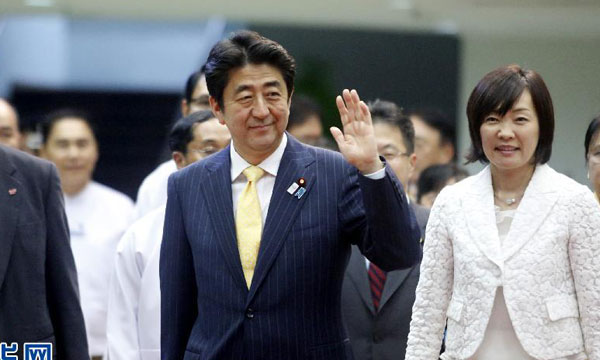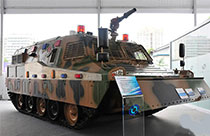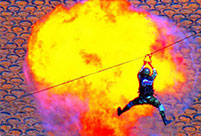

 |
| File photo/Xinhua |
MANILA, Aug. 2 -- The passage by the lower house of the Japanese Diet of the highly unpopular security-related measures could lead to Japan becoming embroiled in a new war, according to the New York Times International Weekly.
An editorial in the July 27 issue of the NYT International Weekly said that Japanese Prime Minister Shinzo Abe, who rammed the measures in the lower house, is already being held in suspicion by many people in Japan and in the region"because of his appeals to Japan's right-wing nationalists and because of doubts about whether he genuinely acknowledges and regrets Japan' s wartime aggression." "The concern is that he will lead a country that has long embraced pacifism into war,"the editorial said.
The New York Times International Weekly is an 8- to 16-page publication that represents the most globally resonant coverage from The New York Times. It is distributed as a stand-alone section in 34 newspapers in 22 countries across North America, Europe, Latin America, Africa and Asia, with a reach of more than 5 million readers each week.
The NYT weekly is issued as a supplement of the Manila Bulletin, a leading Manila daily.
The editorial, entitled"Japan Rethinks Its Pacifism,"said democratic leaders are more successful when they persuade voters to support major policy initiatives and when they follow procedures that ensure changes are broadly accepted. "For many Japanese, Mr. Abe does not appear to have made his case or picked the right way to move forward,"the editorial said.
The bills, which are considered in violation of the country's war-renouncing Constitution by about 90 percent of constitutional experts in Japan, will enable Japan's Self-Defense Forces (SDF) to engage in armed conflicts overseas and help defend others even if Japan is not attacked, or exercise the right to collective defense.
The approval of the security bills sparked large protests in Japan from voters who worried that the changes would violate the country's pacifist constitution and could entangle Japan in a U.S. -led war. The legislation will be deliberated in the upper house.
A survey conducted by Kyodo news agency over the weekend after the measures were passed showed 51.6 percent disapproved of Abe's government. This was the first time that Abe's disapproval rating had topped 50 percent since he took office in December 2012.
In Manila, Jose Cortez, a respected political and diplomatic analyst, in an interview with Xinhua, noted that the security measures were passed a few days before the commemoration of the 70th anniversary of the end of the Second World War.
Cortez, a consultant of the Media and Communication Research Center of the Universidad de Manila (University of Manila), said that the timing of the bills' approval was a clear signal that a genuine apology for Japan's war crimes by Abe is not forthcoming.
The analyst said that the adoption of the security measures would upend the peace and stability in the region which, during the past few years, has achieved unprecedented economic growth.
After the passage of the security measures on July 16, China called on Japan to refrain from damaging China's sovereignty and security interests. "Due to historical reasons, Japan's military and security developments have been closely watched by Asian neighbors and the international community," spokeswoman Hua Chunying of the Ministry of Foreign Affairs in Beijing said.
"The passage of the bills in the lower house of the nation's Diet is an unprecedented move from Japan since the end of World War II, which may lead to a major change in the country's military and security policies," Hua said.
According to wire reports, Abe is now finalizing a statement ahead of Aug. 15 when Japan surrendered to the allied forces in l945.
Japan surrendered after American B-29s dropped its first atomic bomb in Hiroshima on Aug. 6, l945 and the second bomb in Nagasaki on Aug. 9, l945. While it was on Aug. 15, 1945 when Japan announced its surrender to the allied forces ending the Pacific War, it was on Sept. 2, 1945 that the formal surrender ceremony was held in Tokyo Bay, Japan, aboard the battleship USS Missouri.
 No cleavage allowed at China’s largest gaming expo this year
No cleavage allowed at China’s largest gaming expo this year Photo story: A model’s breast implant surgery
Photo story: A model’s breast implant surgery Student proposes during graduation ceremony
Student proposes during graduation ceremony Kiss contest held in Nanning, SW China
Kiss contest held in Nanning, SW China China-made special vehicles in exhibition
China-made special vehicles in exhibition Bikini beauties lifeguards in river rafting place
Bikini beauties lifeguards in river rafting place Yunnan-Myanmar Road: The past and present
Yunnan-Myanmar Road: The past and present Photos of beautiful policewoman become online hit
Photos of beautiful policewoman become online hit An unbreakable army
An unbreakable army The last grave-keeper
The last grave-keeper Amnesty in the 21st century
Amnesty in the 21st century Loggers’ release not victory of diplomacy
Loggers’ release not victory of diplomacy Guo Boxiong family tree reveals deep military roots
Guo Boxiong family tree reveals deep military rootsDay|Week